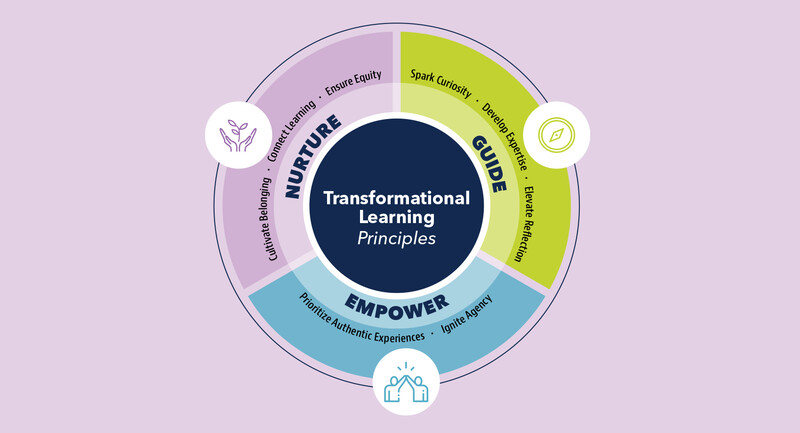Transformational Coaching, the instructional coaching model that I’ve developed and written about in several books, is based on four foundational abilities. Effective coaches know how to:
- Coach the “Three Bs”—behaviors, beliefs, and ways of being (which includes coaching emotions).
- Build, repair, and maintain trust.
- Cultivate a teacher’s agency.
- Navigate power dynamics.
To enact this model with fidelity, and see teachers transform their practice, a coach or leader must be skilled in all four areas.
Given the general state of disempowerment in our schools, I could argue that coaching toward agency is the most essential of these skills. However, that would be too simplistic because these skills are intertwined, and the impact of using them is tightly connected. You can’t effectively coach toward agency if you don’t also build trust and navigate power dynamics. Cultivating an educator’s agency can have a tremendous positive impact on their well-being, as well as on their professional abilities.
What Is Agency?
Agency is the feeling that you can do what you want to do. It means that you have a sense of control over your actions and their consequences. It’s similar to feeling empowered or experiencing a sense of autonomy (one of our core human needs)—in fact, I use the terms agency, empowerment, and autonomy synonymously.
Feeling a sense of agency allows us to feel like we can create the life and experiences we want, which contributes to the sense that we’re thriving.
When people feel they lack agency, they might feel like things happen to them, that they have no say in the whirlwind of life, or that they’re at the mercy of the fates—or the administration or the district. It’s a horrible feeling. On the other hand, feeling a sense of agency allows us to feel like we can create the life and experiences we want, which contributes to the sense that we’re thriving. A Transformational Coach listens for and notices the places where a teacher feels disempowered and then coaches them toward a sense of control over what happens in their professional life.
Coaching Toward Agency
There are many ways in which we can coach toward agency, both within conversations and as we engage in a coaching relationship. Coaching toward agency requires the following:
- Inviting a coachee to have input into the focus or goals for coaching, which may happen at the beginning of a coaching cycle.
- Providing options for a coachee to take the lead in directing the conversation.
- Communicating confidence that a coachee can solve their own problems.
- Guiding a coachee to apply their energy within their sphere of influence and control.
A Transformational Coach might incorporate the above strategies into conversations regularly or periodically. These actions rest on the foundational beliefs that a coachee doesn’t need to be fixed, that they have competencies, and that they act for reasons which may not make sense to you as their coach, but which make sense given their life experiences. When you anchor your work in those beliefs, you invite a coachee to make decisions about the conversation or about problems they’re facing.
When we coach toward agency, we listen carefully for “victim” stories. We recognize these problematic narratives as soon as they pop up, and we name, surface, and interrupt them. This usually requires coaching emotions. Someone who feels disempowered may be experiencing fear, sadness, and anger, and sometimes regret, doubt, disgust, and envy. Often, a sense of powerlessness has deep roots in the person’s psyche and life experiences. While a coach doesn’t probe into those roots (that’s what a mental health professional does), we can skillfully acknowledge them and help a teacher recognize that their history might be contributing to current feelings of victimization.
A Transformational Coach, for example, might respond to a victim story by saying, “I’m hearing that you’re feeling disempowered, and it sounds like you’re telling a victim story. What’s possible for you if you get stuck in this mindset?” This question invites the coachee to reflect on what is available to them to think, feel, and do. If a teacher assumes that they’re a victim to the district’s whims, for instance, then what is possible for them is limited—they are always going to be anticipating being thrown around.
Coaching toward agency requires that you feel a tremendous amount of agency yourself. If you move through the world feeling disempowered, blaming others, or thinking things like, I want to address emotions when they come up in coaching conversations, but I’m sure the district would disapprove, then you can’t coach toward agency. If you don’t believe you can have a positive impact on your experience, you can’t truly coach another to shift into those beliefs. If you want to release a belief that upholds a victim story, you have to do your own work—you have to excavate and examine your beliefs about your agency. Once you’re reconnected to your power, coaching others toward agency follows naturally.
When you hear a teacher express powerlessness, your first move is to name it. This sounds like, “I hear that you want to include this novel in the 9th grade curriculum and you’re afraid that your department will push back. It sounds like you don’t feel like you have power in this situation.” Your coachee may feel relief at hearing this named. Some teachers might spiral deeper into disempowerment, but more often, teachers will begin questioning their own stories, saying something like, “Well, I might be jumping to a conclusion because I haven’t broached the subject of this novel with them, and it only came out two years ago and we haven’t revised our curriculum since then.” The teacher may begin to clarify their sphere of influence and control—a key step toward recovering a sense of agency.
When you hear a teacher express powerlessness, your first move is to name it.
Another move for coaching toward agency is reframing. When you ask a coachee, “Is there any other way to see this situation?” you nudge them to broaden their perspective. You remind them that they know the situation they’re in and that they can explore pathways forward. When you point to possibility, many people reach to grab it. If someone pushes back, they may need to work through some emotional blocks—probably fear and sadness.
A third move for coaching toward agency is deconstructing beliefs. When people are in a victim mindset, they hold fixed, and sometimes inaccurate, beliefs. You can begin to shake up a fixed belief by asking questions like:
- I hear you’re frustrated and feel like your department leader doesn’t take into account your views on curriculum. I’m wondering, how did you come to this conclusion?
- What do you think went into the decisions that your department leader made?
- Would you be interested in having a conversation with your department leader about the curriculum and the novel you want to teach?
- What do you think your department leader knows about this novel?
These questions help the coachee recognize that they are holding beliefs (strongly held opinions, not truths), and this recognition makes space for reflection and change.
I have three goals for any coaching conversation: that the coachee feels more empowered, feels a little more hopeful, and can do something different or better. These goals are interconnected—when someone taps into their agency, they feel better and often subsequently take different actions. We all want to be seen as competent and capable of solving our own problems. Coaching toward agency serves that need.









